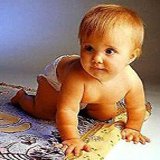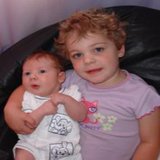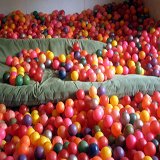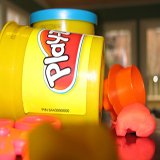Stimulating Child Language Development -
25 Month Old to 30 Month Old
The sophistication of child language development shows through in your child's everyday speech, as she starts to use pronouns (I, you, he/she, etc.) and descriptive words more consistently.
During the 25 month old development to 30 month old development, she is able to hold conversations with other children of her own age, and she enjoys talking to adults as well. The minute details of family life fascinate her and she constantly asks questions.
Child Language Development
25 - 30 month old
Suitable suggestions for Child Language Development
(25 Month Old - 30 Month Old)
Information sharing
Show interest in the endless tales that she brings to you, about this friend or about that toy. She is excited about everything that goes on around her and she wants to share this with you.
You'll find that your child likes to sit beside you, cuddling up to you as she gives an account of her latest exploits. It's important that you respond with questions when she talks to you to let her know you are listening and are interested, and also to force her to think more deeply about the subject.
You can also use these conversations to help your child clarify her speech. For instance, when she starts to tell you about an incident involving another child at nursery or about an older sibling, she probably does so without actually mentioning the name of the child.
Point out that she should name who she is talking about at the beginning. Of course she won't remember this immediately, but at least you are beginning to encourage her to plan her conversation and to think about the needs of the listener.
Pretend play
Now that her imagination is more advanced, try to involve her in pretend play, for example, dressing-up games. Your child thrives on this sort of activity and it provides an opportunity for her to improve her child language development skills because she can pretend to be a completely different person.
Observe her during this type of play - the chances are that when she dresses up as an adult, her voice tone changes and she uses different words. She has great fun marching about the place using new forms of language as she pretends to be someone else.
Right of speech
When you don't let her do what she wants, she might try to shout you down - her instinctive reaction on hearing something she doesn't like is to tell you to be quiet. Calm her, then continue to say what you wanted to say anyway.
She eventually learns that you have as much right to speak as she has, even though she is unhappy with the message you convey to her. Once you've had your say, listen attentively to her response.
Be sure to visit all the child language development pages for different ages.
Read more about the different language development stages.
Top Tips for Child Language Development
(25 Month Old - 30 Month Old)
- Make music together.
- Talk to you child about the programs she watches.
- Emphasize prepositions in your speech.
- Cuddle up together when reading a story.
- Play sorting games with your child.
Play along with her as she tries to get sounds out of her toy musical instruments. She likes blowing the trumpet and harmonica, and bashing the drum. Encourage her to sing as you make music together.
When she has finished watching a television program or a video, chat to her about the program. Ask her basic questions such as the name of the central character.
You can help her understand the meaning of words like 'in', 'on' and 'under' by demonstrating them. For instance, show her how the food goes 'in' the cupboard, and how her plate goes 'on' the table.
Physical contact is very soothing for both of you. Snuggling together during story time relaxes your child and settles her into a positive mood so that she is ready for listening and talking.
Take some familiar toys such as teddies, building blocks or books, and put them in a pile in front of her. Then ask her to give you all die teddies, for instance. she will demonstrate that she can group some objects.
Top Toys for a 25 Month Old - 30 Month Old
- plastic human figures
- clothes for dressing up
- toy zoo with animals
- story books
- music tapes or CD's
- cuddly toys
Be sure to browse through all the language child development pages that is broken down in different age groups.
Read more about the different language development stages.
Find It!
Can't remember where you read something specific? Just type in your search term in the box below and your specific topic will be returned to you instantly.









